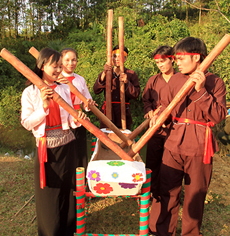(TITC) - Phu Tho Province (North) is home to Kinh, Dao, Tay, Muong, Mong, San Chay... ethnic groups. Each group owns specific characteristics, contributing to cultural diversity of Phu Tho, of which, "cham duong" is a unique festival of Muong ethnic people.
 In Muong language, "cham" means to pound, "duong" means trough of rice, "cham duong" means pounding rice, but in an organized artist manner.
In Muong language, "cham" means to pound, "duong" means trough of rice, "cham duong" means pounding rice, but in an organized artist manner.
In the past, duong was a working tool of Muong women. They wake up from 4 to 6 am in early morning to pound rice. The rhythmic sounds mixed together was like a piece of music echoing throughout mountains and forests. Nowadays, pounding rice by hands has been replaced by threshing machine, but Muong people still preserve cham duong festival in order to thank gods for giving health, prosperous life, happiness as well as to respect their working fruits.
Duong (trough), pestle, rice should already be prepared before festival opening. A duong is made from a big trunk which will be carved in dug-out canoe shape to make unique sounds. It is put on a 4-leg bamboo shelf at the height of 0.5 meter. Pestle is made from wood of ton tree equal to the length of a shoulder pole, the middle part is polished which makes easier to hold. The number of pestles depends on the number of people to pound rice. Harvested rice will be hung on top of the kitchen, waiting for being pounded.
At the festival, members of performance team stand up, their righ hands hold pestles, their left hands keep a sheaf of corn. After a person standing at a head of the duong strikes the pestle into the duong to make an opening sound, other members stand face to face in the two sides of duong start to make the rhymth of pounding tune. They change the sheaf of corn in accordance to the rhymth. The sounds are made by three movements: pounding the pestles right in the middle of the duong; pounding the pestles into the edges of the duong and the pestles beating each other, which makes a lively song, presenting a folk culture of Muong ethnic people.
Hong Thanh